

In the fourth part of this guide, I'm going to cover the Opinion system that creates relationships between characters, the most impressive component of Crusader Kings II. I'll also discuss how marriage works, and how it's used to create alliances, which should cover the bulk of the moment-to-moment decisions you'll be making in the game. I'll also cover Tutoring children and how Traits work, as well as Intrigue.
As ever, this guide is intended to be read and played in order, so I'll be carrying on with my Aquitaine game. The other parts of the guide can be found here:
Part One: Introduction and Interface
Part Two: Laws and Factions
Part Three: Diplomacy and War
Part Four: Relationships and Marriages
Part Five: Long-Term Planning
Alliances
Maintaining a web of alliances can be critical to winning wars, and eventually you'll at least have to defend yourself. So let's check out who our allies are. Click on your character portrait, and down at the bottom, you'll see five info tabs, like Family or Vassals. Allies is one of those...and we have zero. That's not good.

In Crusader Kings II, alliances don't come from a diplomatic interaction between friendly leaders, as they do in most strategy games. Instead, alliances are based purely on people. Alliances only come through marriage. If a leader, or their siblings or their children marry a leader, sibling, or child, that comes with an alliance. (Worth noting: as soon as that marriage is not to the leader/sibling/child anymore, the alliance is off. So if you marry your daughter to another duke who is removed in a civil war, the alliance with that duchy no longer exists.)
So let's start working on marriages. In my game, I have three daughters now. Yours will almost certainly be different, but the process is the same, so this should work with any child your character happens to have. I'm going to click on the second daughter, five-year-old Elena de Poitou. Underneath the blank “Husband” marker is a button which shows a pair of rings, and can be used to Arrange Betrothal. Click it.
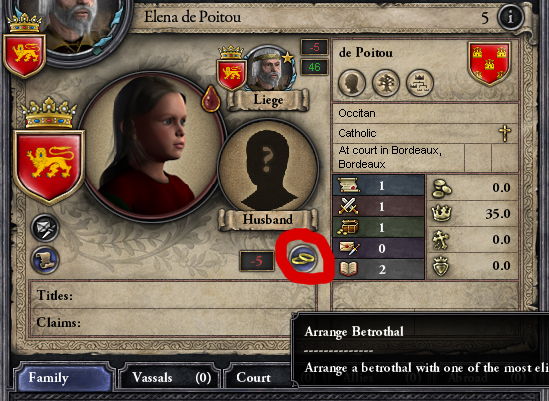
This opens a menu of potential spouses, very similar to the one we used to adjust our council earlier. Like that menu, this one is usually sorted in the way that we want, so you'll rarely need to worry about sorting it again. In this case, it's by character power. So Emperors, Kings, Dukes, Counts, etc will appear first on the list, followed by their children. Here's the important thing: a blue flag on the bottom right of their portrait indicates that marriage will lead to an alliance.
So what are we looking for in our alliance? First, we want someone of equal of greater power—a Duke or a King is most likely. Second, we want someone close to us, so they'll be quicker and more likely to respond to any call to arms we may make. That one's trickier, and being able to see it easily depends on your grasp of medieval geography, which isn't exactly super common. So let's say you're scrolling through this list and you see that you can have an alliance with Samos or Somerset or Anjou. One way to find out where these places are is to click on the shields in those characters' rows.
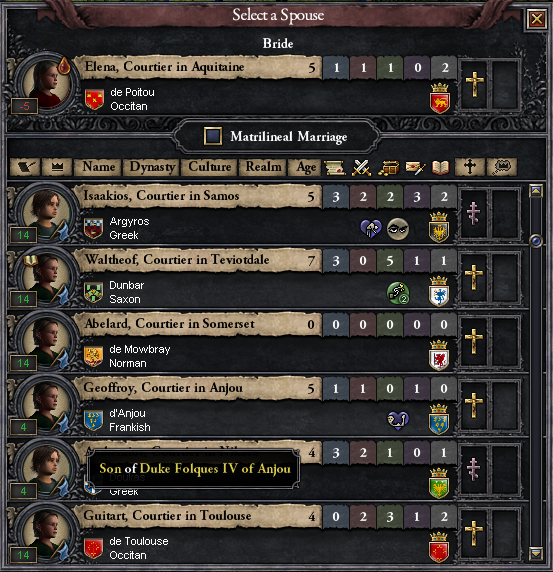
Alternately, Crusader Kings II shows the characters' culture next to them, and those are easier to remember. Looking at Elena, we can see that she's of the Occitan culture. That's southern France. Central France is Frankish. Northern France is Norman (although the Normans did get into England, so that's more complicated). Northern Spain would be Catalan. Meanwhile, someone who's Greek is almost certainly nowhere near where we are.
In this case, Geoffroy of Anjou, son of its duke, offers an alliance with a fellow French duke who happens to be directly north of us, and as a bonus, he's the same age as Elena is. This is a perfect match. So click on him, and you'll be taken directly to the necessary diplomacy screen, where you just send the message and can expect a quick acceptance. Now, when Elena and Geoffroy both turn 16, they'll be married. The alliance will only occur when the marriage does.
Betrothing your siblings/children early has some risks and rewards. Obviously, if you look at the potential spouses early and often, you can pick and choose the best. However, the longer you wait, the more likely their family is to fall upon hard times. If Geoffroy's family is no longer in power by the time both characters are of age, you have a marriage of less political use. You can cancel the engagement, but you'll make enemies doing so. For myself, I tend to wait until the children come of age and go for the immediate alliance, but Betrothals can still be very effective
One other important note: your spouse's statistics are halved, then added to the leader's overall statistics (which, along with Council bonuses, can be seen in parentheses next to their individual statistics on the character screen.) Thus sometimes you'll want to arrange marriages to effective characters, or you'll choose one alliance over another because of the stats.
Matrilineal Marriage
You may be wondering why I chose the second daughter and not the eldest daughter for the initial marriage example. That's because, as a woman who's in line to become powerful in the patriarchal world of medieval Europe, she has to work under different rules.
Here's the problem: as a general rule, children inherit their father's family name. Since Crusader Kings II is a game based on family power, if your family loses its power, you lose the game. Thus, if you're playing a female character whose children inherit their father's name and your lands, you lose the game.
The way around that is to have a matrilineal marriage, which, as the name implies, allows the family line to come from the mother. Let's go to our heir, Aines, to check out how this works. Click her betrothal rings just as with Elena. Notice the Matrilineal Marriage checkbox in the center toward the top. It should be checked automatically, since Aines is the heir, but if not, check it yourself.
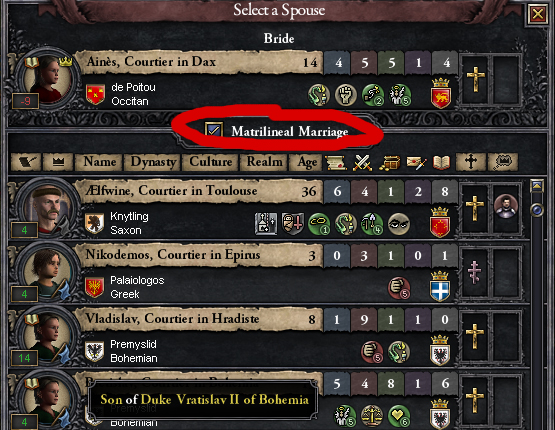
You're going to have fewer potential marriages in a Matrilineal Marriage. These are generally going to be characters who are unlikely to inherit, but there's still a surprisingly decent crop, including the Duke of Bohemia's (most powerful vassal in the Holy Roman Empire) son. On the off chance that your heir finds herself in a non-matrilineal marriage, and her heir is a member of another family, your best hope is to change your succession laws to Election. You can also try to assassinate the heirs until they end up somewhere else, or divorce/assassinate your spouse and try to have new children, then figure out a way to ensure they inherit.
But even with the alliances, you still have to maintain relationships with your allies. If they don't like you, they won't join in your wars. So how do relationships work?
Relationships and Opinions
Most of what's been discussed so far in this guide is conventional strategy game stuff. What sets Crusader Kings II apart; what makes it special, is that it's about people and their relationships. You're not just guiding a nation through its growth, you're managing dozens or even hundreds of different characters and how they think of you and each other—their Opinions.
In Crusader Kings II, Opinions are bilateral and transparent. That means that two characters can have entirely different relationships with one another. Bilateral means that you might like your wife, while your wife hates you. And transparent means that you can always see the status of those relationships.
But let's frame that in simple, pragmatic form: you need your vassals to like you. Why? There are three important reasons. First, the more they like you, the less likely they are to plot and rebel against you. Second, the more they like you, the more troops they'll provide in their levies. Third, the more they like, the more likely they are to vote for the laws you suggest. The last may be the least important, but it's actually one of the easiest ways to see where you're having problems.
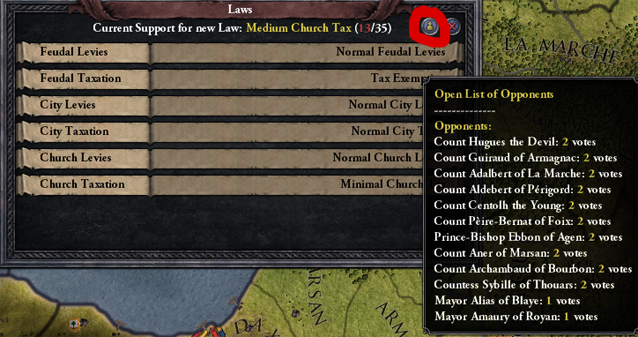
Click on Laws. That tax we wanted to raise back in the second section? Well, it's stuck—we only have 13 votes of 35 total. To the right of that notification is a tiny button that allows you to open the list of opponents to the law. Clicking on that will open a list of vassals who don't like you enough to vote for your laws.
Do that, and you'll see another list of people. (On the off chance that your laws aren't still in limbo, for whatever reason, you can still check Vassal relationships by clicking on your character's portrait, then on the Vassal tab toward the bottom.) Notice how all of these vassals have red, negative numbers in the lower left of their portraits. Those represent how much they dislike you! And the less they like you, the less likely they are to vote for your laws. So we need to improve those relationships.
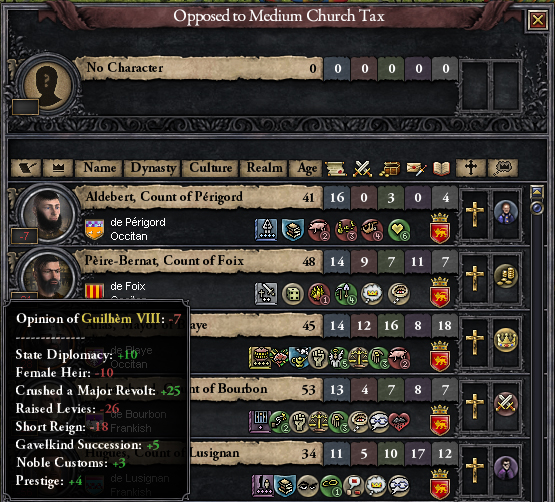
Hover your mouse over one of the numbers to see exactly why your relationship with that character is what it is. Here we're looking at Aldebert, the Count of Perigord. Aldebert's got a mildly negative relationship with Duke Guilherm. You can see that he likes you for things like having crushed a revolt, but he dislikes you for your short reign and raised levies. Both of those will slowly go away—the levies faster than the Short Reign, unless you declare another aggressive war. So Aldebert will, eventually, be on our side, and isn't worth worrying about.
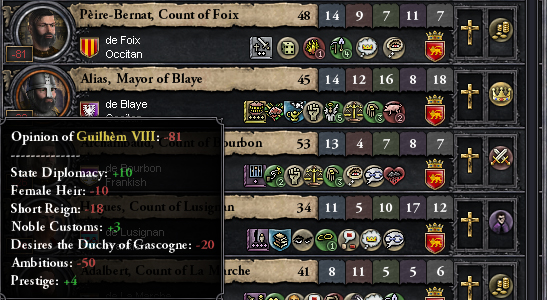
Let's look at the next guy on the list, Pierre-Bernat, the Count of our newly-acquired province of Foix. Notice that he didn't have vassals raised in our last war, which makes sense, since he was on the other side. However, he has two huge penalties which help give him a very poor -81 relationship with you. The big one is that he has the Ambitious trait, which is an instant -50 to his relationship with you. This makes sense. Ambitious nobles will always dislike their liege lord. Also, he “Desires the Duchy of Gascogne.” This relates to his ambition—as a count in Gascogne, he believes he ought to be Duke of Gascogne.
Right-click on his portrait and open diplomacy with him. You have the option to “Grant Landed Title” for the Duchy of Gascogne. This would make Pierre-Bernat very happy, but there's just one small problem. You are a Duke, and you would be promoting him to Duke. Since he would be the same rank as you, he would no longer be your vassal. That's the opposite of what we want!
If you ever become a king, granting duchies to ambitious counts is a superb way to make them your allies. Here, it's a superb way to dismantle your power.
Sometimes you'll see a drop-down indicating that a vassal has a certain percentage chance to rebel against you. That percentage directly relates to their relationship with you, so if you can, it's usually wisest to give them gifts and titles until they're no longer a rebellion threat.
Improving Individual Relationships
There are several ways to improve relationships with other characters, particularly your vassals. Some are targeted directly at certain individuals, some should improve relations with everyone within your lands.
Honorary titles are one of the simplest and cheapest mechanisms for improving relationships with individual lords. Let's go back to Aldebert of Perigord, at the top of the list. He's very, very close to liking you, so granting him an honorary title should nudge him in the right direction. Right-click to open diplomacy with him, then choose Award Honorary Title. Most every title in the game (except for a few insulting ones) grant an immediate 10-15 positive bonus to the relationship. So make Aldebert the Master of the Hunt!
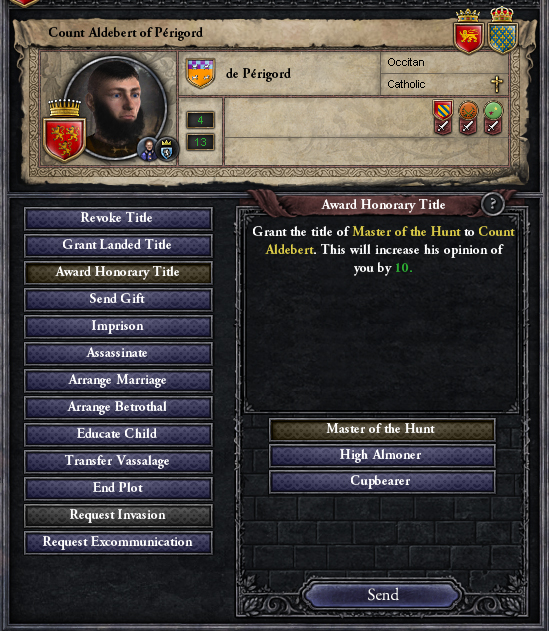
Another quick way to improve relationships with another character is to send them money. Click on the Send Gift option in diplomacy to see how much gold you have to spend to receive how much positive influence. Note that sending gifts is the only way to consistently improve relationships with characters who are not your vassals.
Improving Vassal Relationships Generally
There are a few ways to improve your relationships with all your vassals at once. Click on the Intrigue tab, with the dagger and envelope, to see several of them.

Check out the list of Decisions in the center of the Intrigue menu. Scroll down a bit, and you'll see options like Hold a Feast, Hold a Summer Fair, or Go on a Grand Hunt. All of these are methods for spending a bit of money to slightly impress all of your vassals. I find feasts to be simple and safe, so choose that. If your option is greyed out, hover over the question mark to see why—it's probably just that you need to wait until November.
Click on the feast Decision, and let some time pass. First, you'll have a few options to spend money on entertainment and food. Then, you'll send out the invitations, and a few characters will be jerks and decline. Once the feast starts, you may get a few more decisions, or at least notifications, for friendships made, rude vassals, or even a lover to take.
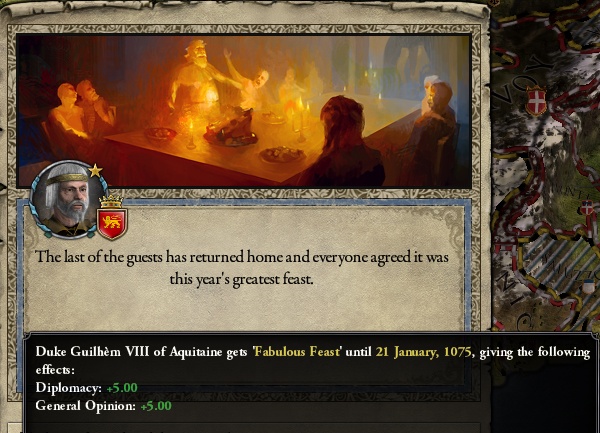
Once it ends, however, you can see the benefits—a +5 relationship across the board for a year counters the Short Reign and Vassal Levies fairly nicely. And +5 diplomacy bonus can have all sorts of side benefits.
Here's another way to help look good in the eyes of your vassals: showing mercy. Since Count Robert of Auvergne rebelled and we defeated him, he's been hanging out in our prison. He's still a count, but he's not exactly your best friend, being behind bars and all. So go to the Intrigue menu, click on Prisoners, and right-click to open diplomacy. Click on Release from Prison.
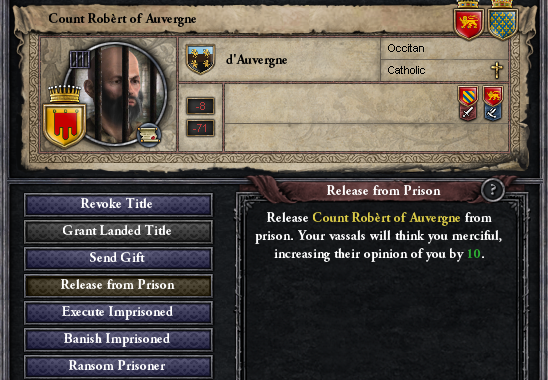
The menu will note that your vassals will note your mercy, leading to an across-the-board improvement of relationships by +10. That's good. Count Robert will also be quite happy to be out of prison without any trouble, so his relationship to you will improve dramatically.
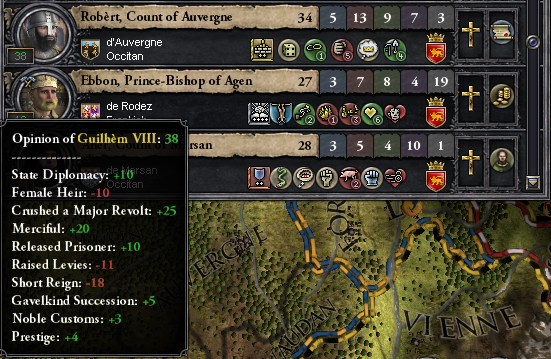
See that +38 where it used to be -8? That's a nice bonus. And it's a pragmatic bonus—you won't have to wait too long see Count Robert change his vote to approve of your tax increase.
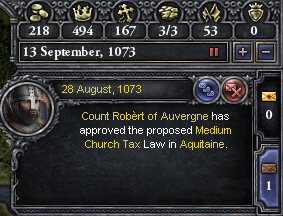
Prisoners
Dealing with prisoners is an occasionally rewarding, occasionally annoying part of the game. To see your prisoners, click on the Intrigue button, then the Prisoners tab. Next to each prisoner are three buttons for dealing with them, but opening Diplomacy with them offers four choices, so I find that I usually use that unless I know what I want.
Releasing a prisoner, as we've seen, slightly improves relationships with the people in the prisoner's lands, as well as significantly improving your relationship with the prisoner him/herself. Ransoming the prisoner doesn't improve relations, but it does give you gold: 10-15 for non-landed nobles, 25 for baron-level nobles, 75 for count-level nobles, and you should be so lucky to capture dukes and above. They can't always pay, but it's very nice when they do.
Alternately, you can dispose of the nobles. If they've betrayed you, you can do so without or with minimal punishment. If not, your vassals will hate you more. Executing a prisoner will, obviously, kill him or her, and it will transfer their lands immediately to their lawful heir. Banishing a prisoner sends him or her away, and it confiscates their titles and money for your character, making it the most self-serving choice, if you can get away with it.
You should also have the chance to Revoke Title on a prisoner. You can only do this once for justly imprisoned vassals (so if they have two counties you can only take one) and they remain a prisoner, and they'll hate you, but you get that title.
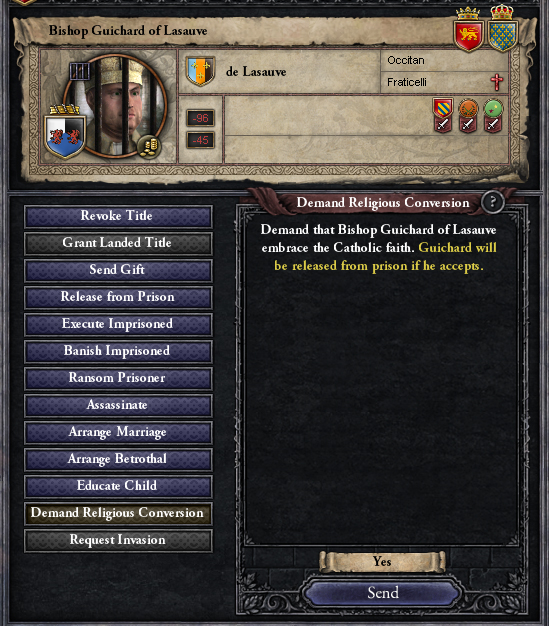
Occasionally your Court Chaplain will decide to embrace a heresy, which should lead directly to his imprisonment via pop-up menu (you can join him as a heretic, but this is a terrible idea for many reasons). Notice how it says his religion is “Fraticelli” with a deviant red cross next to it. Once he's in prison, you can open his diplomacy screen, and demand that he convert back to Catholicism. This usually works, and releases him, but if not, hey, you can get some ransom money, mercy points, or an execution for a meddlesome priest.
Imprisonment
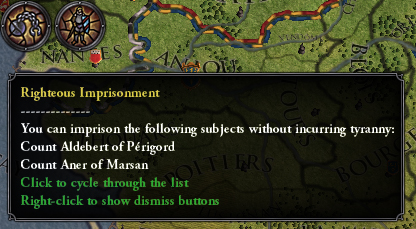
From time to time you'll see a drop-down saying that you can imprison one of your vassals. This is because they're engaging in an illegal plot, and your spymaster has happened to uncover it. If you click on the button, you'll be taken to diplomacy with that character. The odds of arresting them versus them starting a rebellion are shown. Taking that risk can be a great way to relieve a meddlesome vassal of some of their power base, but usually you'll want to just end the plot.
To do that, click on the End Plot button. If the vassal likes you, they should do it automatically. If not, you may need to make them like you, with honorary titles, real titles, or gold. If that gets to be too much—or if they're just ambitious jerks—you may have to use the stick instead of the carrot, and suck up that possible civil war.
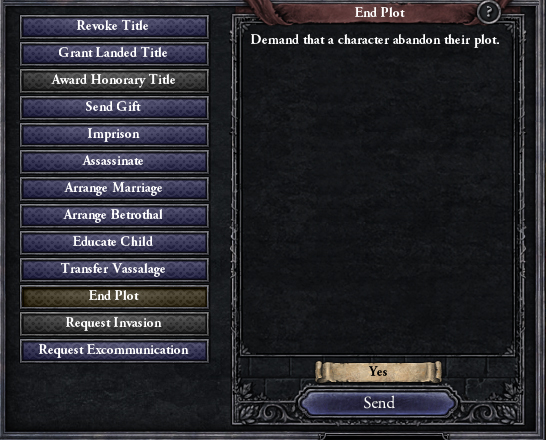
The larger your lands, the less important these plots become—why should you care if some Mayor wants to kill his wife when you're the King of France? It's worth checking out the plots and imprisonments as they come for a while, until you're comfortable enough with skipping them.
Oh, and one more thing—if your Spymaster happens to be part of a plot, he's not going to tell you about it. Be careful putting powerful, ambitious vassals who dislike you in that role. But what kind of plots can you pull off?
Intrigue
Let's head back to the Intrigue screen, which we've dealt with for prisoners and decisions. On the top part of that, you have the option to choose a plot, so click that. Plots are the secret schemes of each noble (compared to Factions, which are the the public schemes).
Right now, Guilhem only has one Plot to choose from, which is normal for characters who don't have certain Traits like “Ambitious”. The one he does have is “See Duchess Matheode of Aquitaine dead”. Duchess of Aquitaine? Hey, that's your wife! In the world of Crusaders Kings II, no matter how uncreative and comfortable your characters, they can still dream of killing of their spouse.
Remember from our look at Alliances that Matheode doesn't happen to be giving us any political advantage, so killing her might serve a purpose. I'll let you decide if you want to pull the trigger on the Plot (I tend not to, because I'm a goody-goody in games), but we'll go through the motions first.
Plots have percentages, where you need to hit certain marks to have the best chances of succeeding. Right now we're at 36.6%, which isn't good.. You also have to have at least one Backer for a Plot—you can't do it yourself. So let's add a Backer or three. Once you've selected the Plot, there's a little circle with a + that lets you invite people to the Plot. Click it.
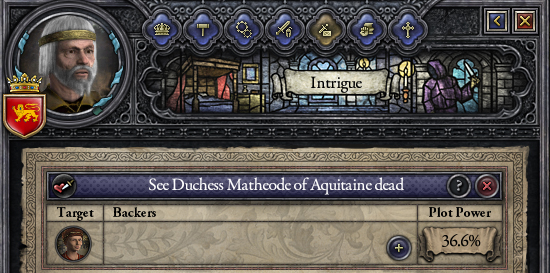
You'll now be taken to yet another character selection menu, which includes everyone who might interested in having Matheode killed. Most of then have a thumbs down, meaning they're against it. A few have a thumbs up. You can hover the mouse over the thumb to see why and, if you're close, maybe tip them to your side with a gift or two via diplomacy. But for now, my Spymaster will add 42% to my plot coming off, so I'm going to click him, and Invite To Plot. Then I'll head back to the Intrigue screen and add a couple vassals lower down the list, which should put me above 100%.
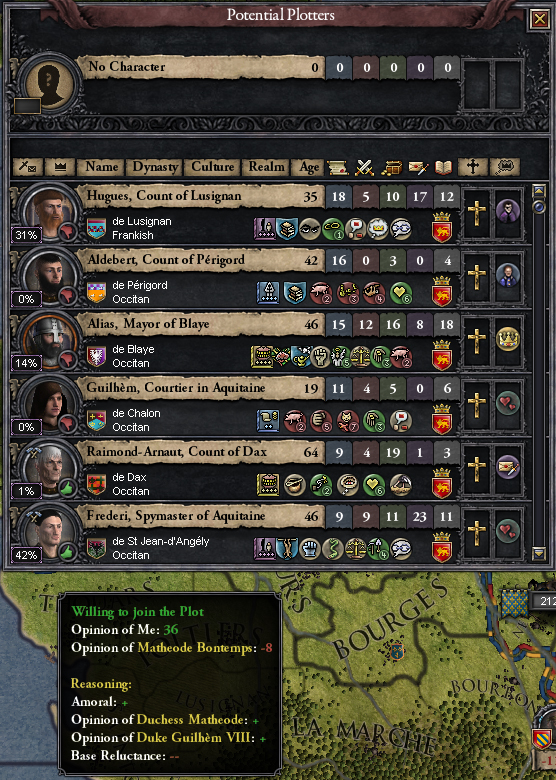
From there, we wait a few days until these vassals join in my scheme, and then it'll start working automatically. (It used to be that you had to pick a Decision like the feast, but that appears to have changed.) One problem—the more people you have in your plot, the more likely one is to blab about it and ruin everything. Failure is entirely possible.
As you've noticed, I'm not terribly excited about this plot anyway, so it's disappointing that it's the only one available to me. Variety of intrigue available to characters hinges on Traits, which are an aspect of the game well worth checking out.
Traits
Click on your character's portrait, then check out the line of icons below his stats on the middle right of the screen. You'll see that he's a Flamboyant Schemer, for example, as well as Greedy and Wroth. Note especially that he's Content, which tends to prevent him from having plots. You'll also be able to see
that each of these Traits has effects on his statistics, like Wroth giving him a better Martial skill but damaging more cerebral skills.
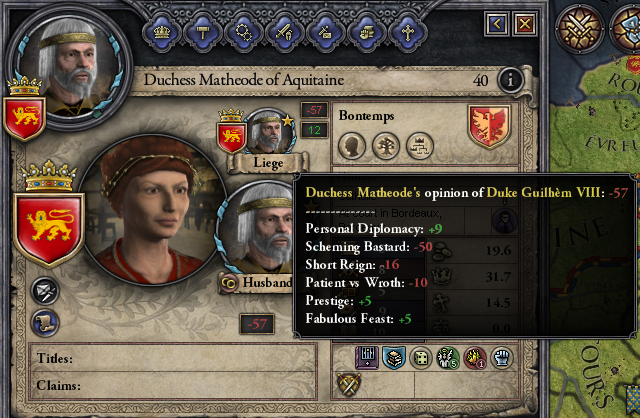
As you've looked through relationships with other characters, you may have noticed that some personality Traits cause conflicts. Here's Matheode's relationship to Guilherm, for example. She's obviously pissed off that he plotted to kill her, yes, but also note that because she's Patient, the opposite of Wroth, she's got a slight intrinsic dislike of Guilherm.
Sometimes you'll get pop-ups that might give you the opportunity to change a Trait, or simply that it's changed. But for the most part, Traits are set in childhood, which is the last thing the main component of the game this guide needs to deal with.
Tutoring
Between the ages of six and sixteen, children in Crusader Kings II require a tutor/guardian. When you need to assign one, you'll get a dropdown from the top. Our second daughter is about to turn six, so this should happen soon. Children are more likely to take on the Traits and statistics of their guardians.
Click on the notification and you'll get taken to the diplomacy menu. Click on Educate Child. You should see your face to the top left of hers, indicating that she's a child in your court, and that you want to educate her with someone else in your court. (Yes, you can try to arrange a tutor from another court, but it's usually more frustrating than it's worth.) Click on the empty portrait slow and you'll see a list of characters who can be Elena's Guardian.
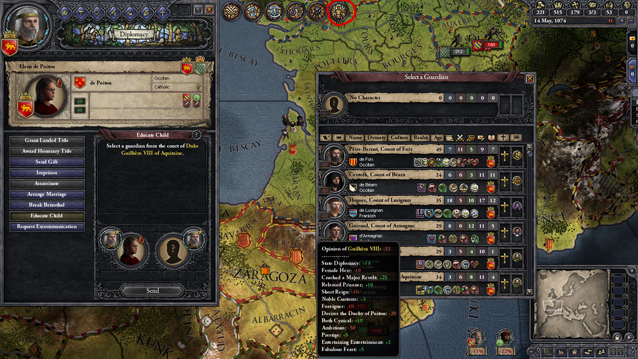
Choosing tutors is one of the times when you'll want to fiddle with the character selection screen sorting the most, because there are lots of different reasons to choose different character types. Let's go through them:
You: There are two chief benefits to picking yourself. First, you get to guide the child to develop how you want them to more directly. Want them to be Cruel and Wroth? Deceitful and Diplomatic? Shy and Humble? These are within your power, with some randomness. Second, it's also kinda fun to deal with the childhood issues through the game menus, like what to do when you discover that the kid has a stutter.
Someone Effective: Since your current character's stats aren't the greatest, if you want your kid to be really good, you should try to get her taught by someone who's smart and strong. The top choice here, Count Hughes, has four really good stats. So does Mayor Alias, who's third on the list. It is by no means a guarantee that they'll train Elena to be as strong or smart, but the odds are better. Clicking on the icons above those stats can sort by the statistics. For example, sometimes I like to take younger brothers and train them specifically for the Martial trait, so that they'll be great military leaders without being a threat to take over from the rightful heir.
Someone Ineffective: Remember back in the Laws section, when we discussed the problems with Gavelkind succession and the fact that the younger siblings of our heir were going to break away with their own duchy? That's still the case in this game, so rather than train our future rival Elena to be a strong ruler, it might be better to find someone who will make her weak, and allow us to retake her lands easily.
Someone who needs a relationship improvement: Crusader Kings II keeps this a little bit under the hood, but it's there: anyone whom you trust with one of your children/siblings to educate will like you better. It's a +20 boost, so it won't change the entire game, but it can help a lot. Click on the quill on the far left to sort the characters by their relationship with you, or click on the crown next to that to sort them by most powerful to least powerful.
I've sorted by worst relationship here, and you'll see that Count Pierre-Bernat of Foix likes us the least, with -57. Bumping that to -37 with Elena won't hurt, nor are his stats anything too strong that we should worry about it. I would pick him in this case.
The Pope and Excommunication
Before I wrap up the main part of this guide, there's one last button to click. On the right-hand side of the menus on the top left is the Religion button. That'll take you to see some information about Pope Alexander II and the church as a whole. Here, you can practice your Free Investiture by appointing successors for your bishops (something I never did, however, it could be useful for removing troublesome sons from the succession wars).
In face, most of the interactions you'll have with the Pope come via other means. One of the Decisions you can make on the Intrigue screen is to Buy an Indulgence, which will spend money to improve your relationship with the Pope (it's much cheaper than the conventional Send Gift) often. With a better relationship, you can request a divorce, for example, or request that a rival be excommunicated.
Excommunication is one of the most subtly powerful tools in the game. The excommunicated character immediately suffers a big hit to his relationship with every Catholic, and it also grants those Catholics an immediate Causus Belli. While this may be possible to survive for a while, any excommunicated ruler will generally be on the defensive.
If you get excommunicated, you can patch it up by going to the Intrigue menu and asking for Penance. This is extremely expensive, but fortunately, it's fairly rare.
Conclusion
With that, we've covered most of the major events and actions that you need to play and understand Crusader Kings II at a basic level. I recommend playing for a while, maybe consulting this guide, and getting a good feel for the rhythm of the game before moving onto Long-Term Planning. Or, if you're the sort of person who believes you need the big picture to understand the details, well, you probably already clicked on that.
Enjoy the game!

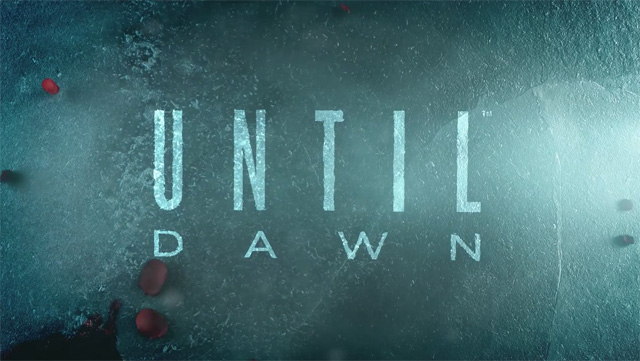


 5 Fascinating Sites for Watching Language Evolve
5 Fascinating Sites for Watching Language Evolve How to unlock Super Saiyan God Super Saiyan Vegeta in Dragon Ball Z Extreme Butoden
How to unlock Super Saiyan God Super Saiyan Vegeta in Dragon Ball Z Extreme Butoden Dead Rising Guide
Dead Rising Guide The 7 Easiest PlayStation Platinum Trophies You Can Earn
The 7 Easiest PlayStation Platinum Trophies You Can Earn The Art Of Titanfall Review
The Art Of Titanfall Review